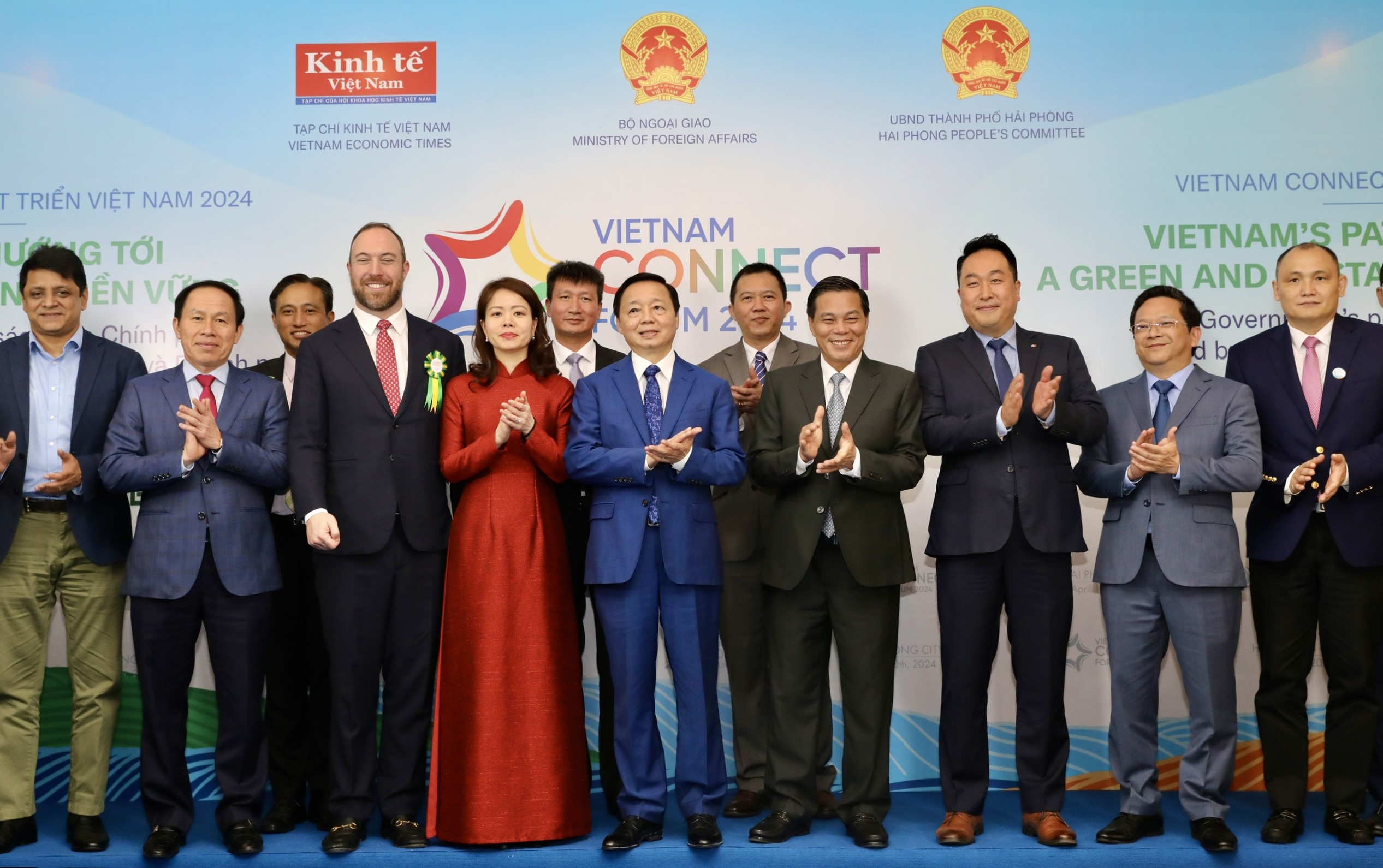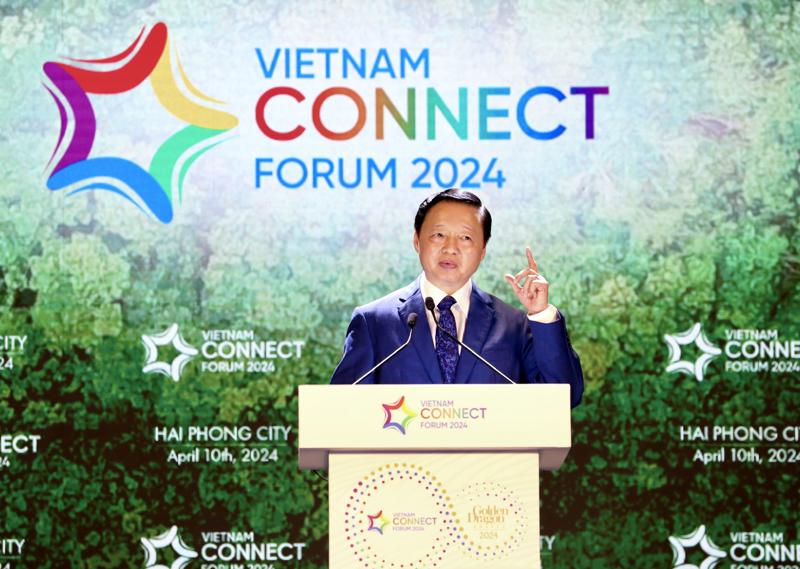As the bustling port city of Hai Phong played host to the 4th Vietnam Connect Forum on 10 April, a palpable sense of momentum and purpose filled the air.
Deputy Prime Minister Tran Hong Ha took the center stage before an international audience of 300 businesses, authorities and organizations, his words carrying the weight of Vietnam's unwavering resolve to forge a new path towards a sustainable future.

A Global Imperative, A Vietnamese Commitment
Deputy Prime Minister Ha emphasized the global significance and sheer urgency of the green economy agenda in his keynote remarks.
"The world's greatest challenge is the challenge of choice on the model of growth," he declared, "and it is time for us to see that the paradigm has evolved."
No longer can nations rely solely on the exploitation of natural resources, he argued, as the prevailing economic models have led to deepening inequality, environmental degradation, and the looming threat of climate change.
But Vietnam, he asserted, has made its choice. "For the first time, we have included it in the resolution of the Party Congress, i.e. the will of the Vietnamese people nationwide. Choose a clean economy model. Circular economy."
This unequivocal commitment, he said, has been further reinforced through a raft of national strategies and policies aimed at driving the green transition.
Overcoming Technological and Financial Hurdles
Yet, Mr. Ha acknowledged that the path to a green economy is fraught with challenges. Chief among them are the technological and financial barriers that stand in the way.
"Nowhere, and I have worked with G7 countries, has ever told me that it is ready for green technology," he lamented, highlighting the pressing need for Vietnam to secure access to the critical innovations that will power the renewable energy revolution.
Equally daunting is the financial conundrum.
"How can global financial institutions respond to the alliance between government and business toward green and sustainable growth?" Mr. Ha questioned, calling for new mechanisms to mobilize the resources necessary to fund the green transformation.
A Collaborative Approach: Government, Businesses, and the Global Community
The Deputy Prime Minister went on to emphasize that no single entity can solve these global problems alone, stressing the need for a collaborative approach that brings together governments, businesses, and the international community.
"No single country can tackle this challenge independently. Only by working in unison can we hope to achieve our goal of limiting the Earth's temperature rise to 1.5 degrees Celsius and preventing a catastrophic three-meter sea level rise," he declared, emphasizing the absolute necessity of collective action. "A three-meter rise in sea level would spell the end of civilization as we know it."
Within this framework, Mr. Ha outlined Vietnam's efforts to forge strategic partnerships, both regionally and globally.
From the country's engagement with the ASEAN-Japan cooperation on carbon neutrality to its pioneering initiatives in offshore wind power with Singapore, Vietnam is actively seeking innovative ways to drive progress, he said.
Prioritizing the Green Transition in Key Sectors
Deputy Prime Miniter Ha also pointed to specific sectors where Vietnam is poised to lead the green revolution. Critical among them is agriculture, which he believes holds immense potential to become a shining example of sustainable development.
"Vietnam's agriculture will forever have its own values and Vietnam's agriculture and food will always be. The world will see the role of Vietnam in the sectors," he proclaimed, highlighting their ability to reduce greenhouse gas emissions while unlocking new opportunities for carbon trading.
The energy sector, too, is a focal point, with Vietnam setting its sights on becoming a renewable energy hub. Mr. Ha outlined plans to harness offshore wind power and explore the transition to hydrogen-based fuels, underscoring the government's commitment to diversifying the energy mix and phasing out reliance on fossil fuels.
Empowering Businesses and Citizens as Agents of Change
The Deputy Prime Minister underscored the critical role that businesses and citizens must play in driving Vietnam's green transformation in a show of agreement with Hai Phong's Party Chief Le Tien Chau, who had said earlier at the forum that "businesses must take the lead."
"The businesses we encourage are those who share our commitment to green and sustainable growth. A key priority is partnering with companies willing to invest in research and development, transferring technology to advance these goals. Without green research, green implementation and development are impossible," Mr. Ha emphasized.
"We should phase out investment based on low-cost labour and land," he stated adamantly. "We must set green and sustainable criteria, and they will be our criteria in attracting foreign investment."
Equally important, he said, is the need to empower local communities and individuals as agents of change. "If we can do business perfectly, then everyone will have an approach. Just thinking about this green growth model, this way of doing things, I think that even farmers, i.e. every farmer, every business will be the nucleus of transformation."
A Roadmap for Sustainable Progress
As the Deputy Prime Minister extended his strategies, he called for a collaborative effort to chart a clear roadmap for Vietnam's green transition.
"This conference needs to move beyond mere discussion and focus on how we can assist the government in fulfilling its mission. We are willing to listen to businesses, citizens, and all stakeholders to drive innovation and optimize collaboration between the government, localities, businesses, and the public."
With a renewed sense of purpose and a steadfast commitment to sustainable development, Vietnam stands poised to lead the way in the global green economy revolution. As the world watches, the nation's unwavering resolve to forge a new path towards a greener, more resilient future serves as an inspiration for all.









 Google translate
Google translate